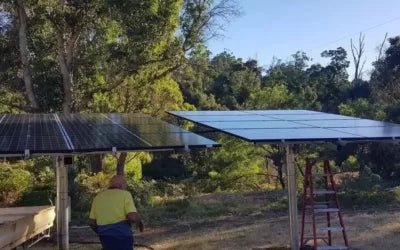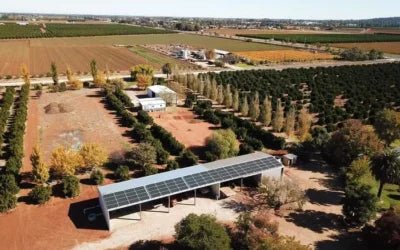Solar water pumps help farmers save money and time while allowing them to operate more sustainable farming practices. Solar pumps are powered by sunlight and can be used to irrigate crops and provide drinking water for livestock. With recent technological advancements driving higher efficiency of water distribution with less sunlight, hundreds of Australian farmers are switching to solar pumps from diesel. Australian farms are innovative and have a high rate of adoption of technology and renewable energy, such as solar, to power their agriculture operations.
Today, we will discuss the benefits of solar water pumps for our hard-working farmers in Australia and beyond. We’ll also take a look at why solar pumps for farms are better than diesel water pump systems.

Solar Water pump types
First, let’s take a look at the different types of Solar Water Pumps. In this article, we’ll focus on two main pump types: Submersible and Surface Water Pumps.
1. Submersible (Bore) Pumps
This is a solar water pump that can be submerged in the water of your water source (eg pond, dam, bore. All of the electrical connections are waterproof due to them being tightly sealed. Submersible pumps are an efficient option for moving water as the pump is submerged in the liquid it is pumping and therefore does not expend excess energy on suction lift to get the liquid into the pump. As a general rule it is easier to push water than pull it.
Types of Submersible Pumps
There are two types of submersible pumps that are most common in the industry. Let’s take a quick detour to look at these further.
Helical Rotor Submersible Pump

Centrifugal Submersible Pump
A submersible centrifugal pump uses spinning impellers to move water using centrifugal forces. Multiple impellers (stages) are added to increase pressure and create required lift. Unlike helical rotor pumps, centrifugal pumps require a minimum speed to pump water. This speed will vary depending on the application e.g. how far and how high the pump needs to push the water.
Submersible Pump System Diagram

2. Surface Water Pumps
Unlike submersible pumps, surface pumps are not waterproof. These units should be placed in a waterproof pump pit or pump house. However, if they are placed too high above the water level, the pump can have suction problems. This will make the system ineffective or even damage the pump.
A surface pump motor powers impellers, which then drives the water upward. Then the impellers will begin to spin, which sucks the water into the pump. Afterwards, the water will get pushed through the body of the pump and finally into the destination, such as tanks or sprinklers.
-
Residential Water
Residential or “domestic” water is commonly used for the kitchen sink, bathroom sinks, bathtub or shower, dishwashers, washing machines and for drinking. -
Livestock and Irrigation
This is probably the most common use for LORENTZ solar water pumps. This water is pumped to livestock tank or into your gardens and orchards. -
Special Uses
Special uses could include water fountains, solar hot water systems and other non-traditional or essential uses of water.
How do farms benefit from Solar Water Pumps?
Now that we’re familiar with the diverse world of Water Pumps, let’s talk about how they exactly benefit farms. Why do Australian farmers need them and why are they crucial to any agricultural operation?
Drinking Water for livestock
One of the major benefits of using solar-powered water pumps is to provide drinking water for livestock. A solar water pump will harness the sun’s energy to pump water from any nearby bore, creek or pond to tanks that can be used to replenish watering troughs. A solar water pump system is an affordable and portable solution for livestock drinking water. If your cattle is grazing in fields that don’t have a permanent watering system, a solar water pump is the best off-the-grid solution for such circumstances.
Irrigation
The other common use for solar water pumps is irrigation. Utilising solar water pump systems for irrigation can increase a farm’s revenue considerably due to the inherent cost-saving benefits of renewable energy. Farmers won’t have to rely on grid electricity or costly diesel to fuel their water pumps. This is particularly beneficial for farms in remote locations with inconsistent access to electricity or fuel. While you can use various types of water pump systems, it is common to use horizontal centrifugal pumps for irrigation. That’s because they generally offer lower costs, require less maintenance, and are easier to install and inspect for maintenance than other types of water pumps.
Benefits of Solar Pumps vs. Diesel Pumps
On paper, it’s clear that a solar water pump is more cost effective than a diesel pumping system in the long run. However, there are many who believe that diesel water pumps are more dependable than solar. Maybe because farmers are more familiar with diesel water pumps. After all, they were the standard and the norm for many decades.
However with the rapid change in technology, this is no longer true. Here are real-world benefits of why solar water pumps are exponentially better than diesel pumps.
Designed for optimal performance in dry regions
As water scarcity and severe droughts have become an ongoing problem in many regions over the past years, more and more farmers are going towards solar solutions to fulfill their energy requirements.
Unlike diesel, solar water pumps are specifically designed to use in sun-drenched areas of the world. In dry regions like Australia, the sun is the fuel itself.
Sustainable farming
Solar energy reduces carbon footprint or the amount of carbon dioxide and other carbon compounds emitted due to the consumption of fossil fuels by a particular person or group. That is why it has become crucial to invest in sustainable and renewable energy sources such as solar power.
Low-Cost Energy Source
The most significant benefit of solar energy and why more Australian farmers are choosing it is that it’s essentially a zero cost energy option. There is no doubt that solar power is the cheapest source of power in the world. It will save farmers a lot of money and they won’t have to rely on the grid. Also, solar-powered products relieve smallholder farmers from high electricity consumption which can result in electricity bill hikes.
Sizes Allow for Storage and Transfer
Traditional water pumps that use diesel and other fossil fuel tend to be heavy and bulky units. On the other hand, most solar water pumps can be carried to the site of operation and installed easily and quickly. The other advantage of portable solar power systems is that you can store them easily when not needed or if severe weather threatens to damage your equipment.
Summary
As you’ve learned today, solar water pumps offer a variety of benefits over pumps that rely on diesel or on-grid electricity. If you’re interested in learning more about solar water pumps for your farm, we would be happy to help. Our team of experts is passionate about renewable energy and can provide you with all the information you need to make an informed decision. Enquire or find dealer below to learn more.







